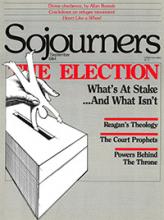Immigration reform is an issue that is guaranteed to bring out some of the worst contradictions in American society. Emma Lazarus' words on the base of the Statue of Liberty symbolize the open-door policy that is supposedly an American tradition: "Give me your tired, your poor, your huddled masses yearning to breathe free." The earnest, hopeful immigrant is a central figure in the long-held image of the United States as a land of refuge, freedom, and opportunity for all who come here willing to work for it.
Read the Full Article

Already a subscriber? Login
